
Located in the northeastern part of the Indian Ocean, the Bay of Bengal comprises 2,172 million km2 of maritime zones impacting the international trade and the livelihoods of millions of people in South Asia. However, criminal activity, such as illegal, unreported and unregulated fishing (IUUF), trafficking in persons (TiP) and smuggling of migrants (SoM), is known to take place in these waters. Similarly, opioids produced in Central Asian nations is loaded onto dhows and transported through the Arabian Sea towards both West and East. In the East, they transit through South Asian countries, including India, Sri Lanka and the Maldives, to then reach further destinations. This is known as the Southern Route, a well-establish maritime path for opioids smuggling in the Indian Ocean region. To tackle this, UNODC’s Global Maritime Crime Programme (GMCP) Indian Ocean East (IOE) Team is mandated to support Member States to build and strengthen their capacity in addressing and countering maritime crimes in the region, focusing on mainly Bangladesh, the Maldives, Myanmar and Sri Lanka.

Due to the challenges posed in the surveillance of vast maritime areas in the Indian Ocean where illicit narcotics are trafficked, GMCP convened the Southern Route Partnership (SRP) under the Indian Ocean Forum on Maritime Crime (IOFMC). The SRP was created in 2016 and serves as an interactive space that encourages members of national drug enforcement agencies, donors, international organizations and partner agencies from Indian Ocean States to enhance international coordination, collaboration and cooperation in countering drug trafficking on the Southern Route. Following a high-level ministerial meeting in Colombo, Sri Lanka, a Conference Paper titled “Drug Trafficking on the Southern Route and Impact on Coastal States” was published, serving as a baseline document to urge Member States in the strengthening of new and ongoing international endeavours among relevant national agencies to disrupt drug trafficking in the Southern Route.
Drug production impacting Indian Ocean states takes place in two main regions: the “Golden Crescent”, comprising illicit opium production areas in Iran, Afghanistan and Pakistan; and the “Golden Triangle”, the second largest opium production region in the world, covering Myanmar, Thailand and Laos. While heroin produced in the Golden Crescent is trafficked through the Southern Route, drug production in the Golden Triangle has shifted to methamphetamines, including Yaba, a highly addictive pill that combines methamphetamines and caffeine, smuggled into South and Southeast Asian countries. Yaba has become widely popular in Bangladesh, where the drug is trafficked into the country through the Naf River, a fluvial bordering area with Myanmar.


In response to these phenomena, one main area of support by GMCP’s IOE is to strengthen the capacity of maritime law enforcement agencies from targeted Member States, including coastguards, navies, drug enforcement departments and marine police, to efficiently and effectively combat transnational organized crime at sea. For instance, in Sri Lanka and the Seychelles, GMCP designs and delivers Visit, Board, Search and Seizure (VBSS) training courses, tailored based on current trends and dynamics on maritime criminality. These trainings bring together MLE officers from several countries from the same region to encourage the exchange of practices, experiences and expertise in the tackling maritime crime. Recently, prosecutors and judges have taken part in these courses to better understand the challenges faced by boarding officers during maritime interdictions, while providing advice for maritime law enforcement officers on legal provisions for adequate evidence handling to ensure successful legal finish of maritime offences. Similarly, GMCP’s IOE Team has trained MLE officers on basic searching of vessels in the Maldives and the Seychelles, combining both theoretical and practical exercises in simulated scenarios to allow a more comprehensive depiction of onboard vessel examinations.
GMCP’s IOE Team also complements its support with access to technology and resources to ensure that targeted Member States can better identify transnational organized crime at sea, including drug trafficking, TiP and SoM as well as asymmetric threats at or from the sea. For instance, Maritime Domain Awareness (MDA) equipment has been provided for MLE agencies in Sri Lanka and the Maldives to allow for more accurate collection and analysis of MDA information, ranging from suspect vessel identification to outreach of local fishing fleets on sightings of anomalies at sea. In Bangladesh, GMCP’s IOE Team supports border security capability in combating illicit synthetic narcotics trafficking across riverine areas bordering neighbouring countries. In the same vein, GMCP’s IOE Team has worked with national counterparts and local communities in the Maldives for the delivery of workshops on security awareness, preparedness and response to island councils and tourism providers. In Sri Lanka, littoral border control is strengthened by providing security-related equipment to disrupt the potential flow of explosive materials and weapons by sea.


The effectiveness of national efforts to counter maritime crime affecting Indian Ocean countries can be also significantly boosted by strengthening international cooperation and collaboration. In order to address the transnational nature of crimes, GMCP’s IOE Team provides maritime law enforcement officers, including heads of drug enforcement agencies, prosecutors and judges, the opportunity to actively participate in spaces to enable the contact with their counterparts in other countries in the region. One of them is the Prosecutors’ Network, under the IOFMC, which allows senior prosecutors from Indian Ocean states to share knowledge and expertise in investigating maritime crime, as well as creating strategic and innovative approaches for the prosecution of maritime offences.


